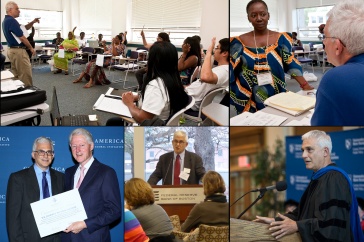
Dartmouth College Professor Bruce Sacerdote speaks during the Hogan Lecture at UNH Paul College on March 28.
Have you ever considered that the people you grew up with could be critical factors in shaping your future education and finances?
These peer effects occur daily as people continuously impact those around them by providing social and professional connections and modeling each other’s behavior.
Bruce Sacerdote dove deep into the subject of “Impacts of Neighborhood: Why Children Turn Out the Way They Do,” during the John A. Hogan Distinguished Lecture on March 28 at the UNH Peter T. Paul College of Business and Economics.
Sacerdote is the Richard S. Braddock 1963 Professor in Economics at Dartmouth College and has significant expertise in education and child development.
During the lecture, Sacerdote credited Raj Chetty and Nathaniel Hendren for their research, establishing that the better the neighborhood a child grows up in positively correlates to their future earnings, college attendance rate and fertility and marriage patterns.
Hoping to advance research on the subject, Sacerdote and collaborators are involved in research examining neighborhoods' impact on Army children. Unlike the previous research where families choose to move into a neighborhood, the Army assignments are random and may only last for three years, according to Sacerdote.
“The random assignment is one of the things that makes this paper exciting,” Sacerdote says. “That means you can really look at how a neighborhood, a school system and a ZIP code influence outcomes.”
While previous research establishes that the longer a person experiences a neighborhood influences future outcomes, Sacerdote’s research involving Army families shows that the ages they experience the neighborhood matter the most.
For example, adolescents aged 14 to 17 who resided in counties ranked in the top 25 percent in terms of socio-economic status had stronger outcomes in terms of going to college and future earnings. The research also found that higher SAT scores were associated with children who lived in these neighborhoods from ages 11 to 13.
“We take a much deeper dive into which years are most critical,” Sacerdote says. “For these types of effects, high school matters a lot. It doesn’t matter so much for SAT scores because you’re only halfway into high school before you start taking SATs. Middle school matters a lot for SAT scores, but high school matters a ton for applying to college.” 
While neighborhoods matter to future outcomes, Sacerdote stressed that there are programs and educational opportunities that can help children who don’t reside in counties in the top socio-economic percentiles. He presented research showing the positive impact of the Cal Grant financial aid program and charter school lotteries on students.
“The right policy can boost college-going and can boost income by as much, and in some cases even more, than moving from one neighborhood to an amazing neighborhood,” Sacerdote says.
The John A. Hogan Distinguished Lecture is a signature event at Paul College. Hogan was a UNH professor of economics and business from 1947 through 1974. He gifted the Department of Economics a fund to establish a professorship and annual lecture in his name to help promote awareness and understanding of contemporary issues relevant to the welfare and productivity of the American workplace.
The John A. Hogan speaker series invites a distinguished individual from academia, public policy, government, organized labor or business to speak on significant U.S. labor market trends and relevant policy issues.
-
Written By:
Aaron Sanborn | Peter T. Paul College of Business and Economics | aaron.sanborn@unh.edu




















































